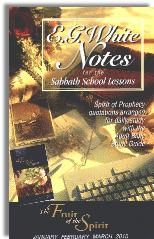|
||||||||||||||
Commentary on "The Fruit of the Spirit is Self-Control"
Day 3: Monday, March 1, 2010
Overview
The account of the life of Joseph is one of the very few biblical personalities where none of his sins are recorded. His record of complete faith in God reveals the life of an ordinary sinful man who had been imbued with a spirit of self control that is without parallel from the earliest days of his youth.
Observations
In Hebrews Chapter 11 he is listed as someone we can look to for an example of faith. Yet, the bible doesn’t record his deeds being, as today’s lesson implies, the result of him being righteous. Only where a person has the righteousness of God can they be said to be a righteous person, in that they ‘wear’ God’s imputed righteousness.
Joseph’s righteousness is the same as it is for us because ‘all have sinned and fall short of the glory of God,’ Rom. 3:23 ESV. His righteousness was a gift from God, not a result of his own deeds or self generated faith.
All of his actions reflect his understanding and acceptance of the dreams he received from God that are recorded in Genesis Chapter 37. By faith he believed these dreams to be a promise from God and from his subsequent behavior; we see that he knew God would fulfill all that he promised. While the biblical account doesn’t say, he surely saw the providence of God when a caravan came along and he was sold into slavery instead of being murdered by his brothers. He had the Spirit of God in his life while in the household of Potiphar. His interpretation of dreams and subsequent rise to second in command in Egypt portrays a person who walked closely in the councils of God in all circumstances.
We see that Joseph understood that God’s providence was in his life even when evil things occurred to him:
But Joseph said to them, "Do not fear, for am I in the place of God? As for you, you meant evil against me, but God meant it for good, to bring it about that many people should be kept alive, as they are today. So do not fear; I will provide for you and your little ones." Thus he comforted them and spoke kindly to them (Gen. 50:19-21 ESV).
Nearing the end of the book of Genesis we find these words he spoke to his family:
And Joseph said to his brothers, "I am about to die, but God will visit you and bring you up out of this land to the land that he swore to Abraham, to Isaac, and to Jacob." Then Joseph made the sons of Israel swear, saying, "God will surely visit you, and you shall carry up my bones from here" (Gen. 50:24-25).
Here, it is obvious that he knew about the promise God made to Abraham which would include four hundred years of slavery. Yet, by faith he knew his people would depart again and instructed them to take his bones with them. In all things, both the good and the bad, he saw the providence of God at work.
The life of Joseph is an excellent illustration of total faith in God that includes God empowered self control.
In the teacher’s notes there is one statement that needs to be addressed. On the topic of how to be free of the world’s concept of “free will” it is suggest that a Christian must “claim the fruit of the Spirit, which includes self-control”.
Claim what? A Christian already has the indwelling of the Holy Spirit. We are to walk in the Spirit, not seek more of what we already have.
And those who belong to Christ Jesus have crucified the flesh with its passions and desires. If we live by the Spirit, let us also walk by the Spirit. Let us not become conceited, provoking one another, envying one another. (Gal. 5:24-26 ESV)
Summary
- Joseph’s faith was such that he saw past his immediate circumstances trusting that God would fulfill all his promises. His self controlled and disciplined life didn’t depend on his rescue from the pit or the prison or even in the ‘good times’ when he was reunited with his family. He fully trusted God.
- If you have the Holy Spirit’s fruit of self control missing in your life you need to consider the possibility that it is because you are also missing the Holy Spirit.
GO TO DAY 4
Copyright 2010 BibleStudiesForAdventists.com. All rights reserved. Revised January 25, 2010. This website is published by Life Assurance Ministries, Glendale, Arizona, USA, the publisher of Proclamation! Magazine. Contact email: BibleStudiesForAdventists@gmail.com.
The Sabbath School Bible Study Guide and the corresponding E.G. White Notes are published by Pacific Press Publishing Association, which is owned and operated by the Seventh-day Adventist church. The current quarter's editions are pictured above.
Official Adventist Resources
Standard Edition Study Guide Week 10
Teacher's Edition Study Guide Week 10
Easy Reading Edition Study Guide Week 10
Search the Complete Published Ellen G. White Writings


